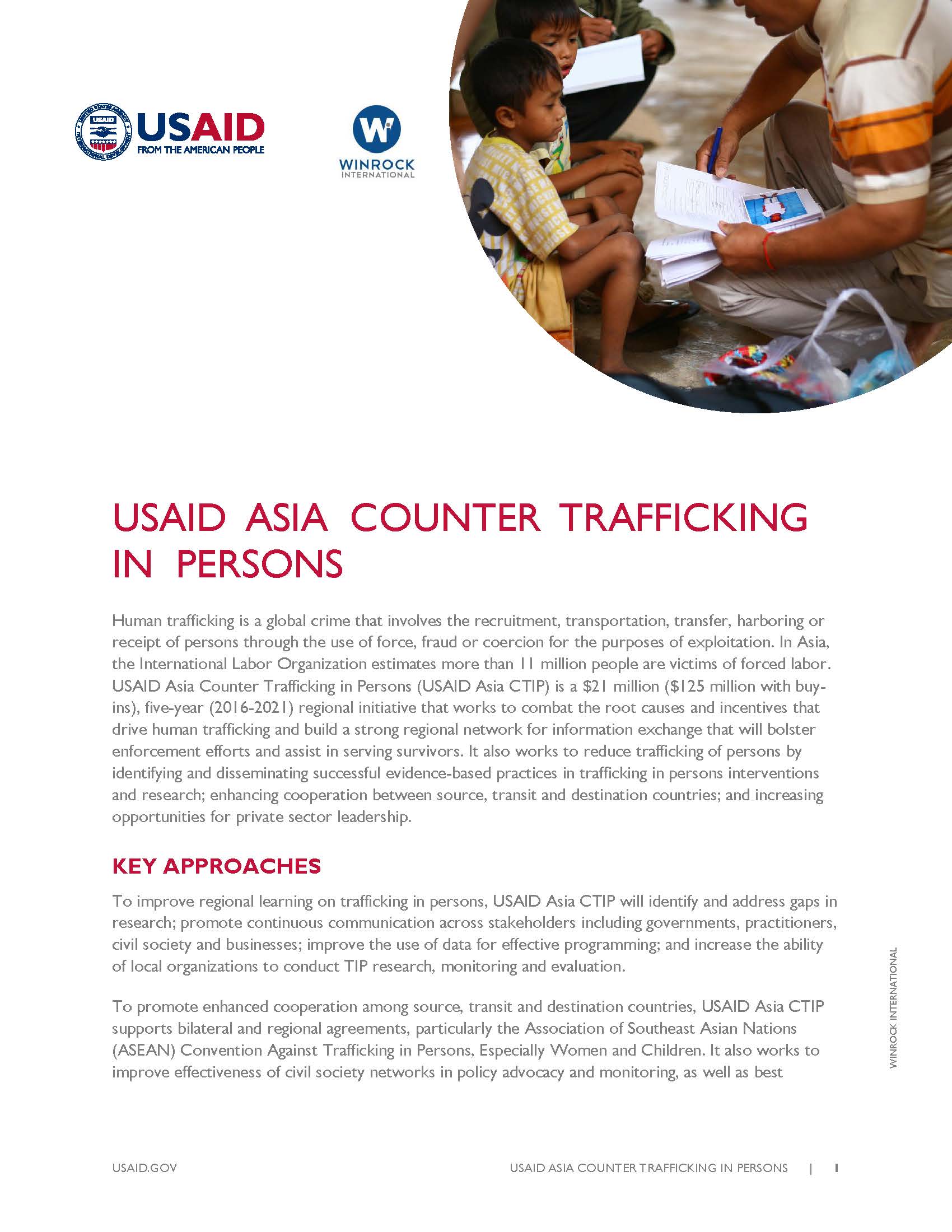USAID Asia Counter Trafficking in Persons ![]() (pdf - 253k)
(pdf - 253k)
Human trafficking is a global crime that involves the recruitment, transportation, transfer, harboring or receipt of persons through the use of force, fraud or coercion for the purposes of exploitation. In Asia, the International Labor Organization estimates more than 11 million people are victims of forced labor. USAID Asia Counter Trafficking in Persons (USAID Asia CTIP) is a $21 million ($125 million with buy-ins), five-year (2016-2021) regional initiative that works to combat the root causes and incentives that drive human trafficking and build a strong regional network for information exchange that will bolster enforcement efforts and assist in serving survivors. It also works to reduce trafficking of persons by identifying and disseminating successful evidence-based practices in trafficking in persons interventions and research; enhancing cooperation between source, transit and destination countries; and increasing opportunities for private sector leadership.
KEY APPROACHES
To improve regional learning on trafficking in persons, USAID Asia CTIP will identify and address gaps in research; promote continuous communication across stakeholders including governments, practitioners, civil society and businesses; improve the use of data for effective programming; and increase the ability of local organizations to conduct TIP research, monitoring and evaluation.
To promote enhanced cooperation among source, transit and destination countries, USAID Asia CTIP supports bilateral and regional agreements, particularly the Association of Southeast Asian Nations (ASEAN) Convention Against Trafficking in Persons, Especially Women and Children. It also works to improve effectiveness of civil society networks in policy advocacy and monitoring, as well as best practices in victim identification, service provision, behavior change campaigns, private sector networks and other areas.
Finally, to increase opportunities for private sector leadership in CTIP, the program encourages public-private partnerships to reduce TIP in priority sectors such as agriculture, construction and domestic work. It also helps reduce consumer demand for goods and services produced by trafficked persons by partnering with media outlets to increase awareness and mobilizing consumers to demand exploitation-free supply chains. It promotes innovative solutions to priority challenges and develops best practices for the use of information and communications technology and other tools to fight human trafficking.
GEOGRAPHIC FOCUS
The Lower Mekong countries of Burma (Myanmar), Cambodia, Laos, Thailand and Vietnam, as well as Bangladesh, are the primary geographic foci. In addition, USAID Asia CTIP activities reach all ASEAN member states and Southeast Asia as a whole. USAID Asia CTIP partners will examine key trafficking flows in South Asia to key destination countries in East Asia. Finally, USAID and its implementing partner Winrock International explore the situation in the Gulf States where significant numbers of Asians have been trafficked.
PARTNER
Winrock is working with five partner organizations – the Global Alliance Against Traffic in Women, Liberty Asia, the Mekong Club, the NEXUS Institute and SSG Advisors – who have specialized technical expertise and extensive networks to effectively address TIP. Through its Advisory Board and ongoing activities, USAID Asia CTIP integrates the voices and concerns of migrant and survivor groups into implementation and monitoring. In addition, more than 25 resource organizations, including research institutions, multilateral agencies, international and local civil society organizations, and private sector companies contribute their distinct perspectives and knowledge to the program while benefiting from its reach, generating new learning and networks.
Click here for the pdf file.








Comment
Make a general inquiry or suggest an improvement.